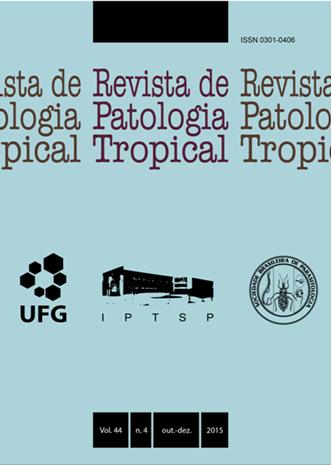FREQUÊNCIA DE PARASITOS INTESTINAIS E COMENSAIS EM CATADORES DE LIXO DE DUAS COOPERATIVAS NO DISTRITO FEDERAL, BRASIL
DOI:
https://doi.org/10.5216/rpt.v44i4.39238Palavras-chave:
Parasitos, comensais, catadores de lixo, Distrito Federal, BrasilResumo
Este estudo descreve a ocorrência de parasitos intestinais e comensais em catadores de lixo de duas cooperativas de materiais recicláveis do Distrito Federal. Amostras de fezes de 75 indivíduos foram analisadas segundo os métodos de Rugai e da sedimentação espontânea. Um questionário foi aplicado para avaliar os conhecimentos dos catadores acerca de doenças causadas pelo manuseio do lixo e das formas de prevenção. Foram diagnosticados 60 (80%) indivíduos com protozoários ou helmintos intestinais. Os protozoários mais frequentes nos indivíduos infectados foram Entamoeba coli (43%), Endolimax nana (28%) e Entamoeba hartmanni (15%). Helmintos, como Ascaris lumbricoides (12%), ancilostomídeos (8%) e Strongyloides stercoralis (8%), também foram encontrados. As outras espécies identificadas foram: E. histolytica / dispar (8%), Giardia lamblia (7%), Hymenolepis diminuta (3%) e Hymenolepis nana (3%). Entre os catadores, 39 (65%) apresentaram infecções mistas. A maioria (80%) afirmou que tivera alguma doença parasitária e 72% informaram que já haviam realizado exame de fezes. Todos os indivíduos consideraram importante o uso de equipamentos de proteção individual, porém apenas 40% trabalhavam com luvas. A adoção de hábitos saudáveis de higiene e o uso adequado de equipamentos de proteção individual devem reduzir a ocorrência de parasitos intestinais nestes indivíduos.Downloads
Downloads
Publicado
Como Citar
Edição
Seção
Licença
The manuscript submission must be accompanied by a letter signed by all authors stating their full name and email address, confirming that the manuscript or part of it has not been published or is under consideration for publication elsewhere, and agreeing to transfer copyright in all media and formats for Journal of Tropical Pathology.

